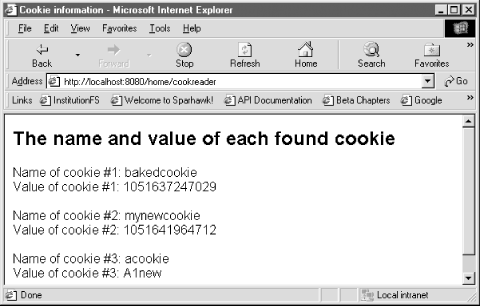| [ Team LiB ] |
|
Recipe 10.4 Reading Cookie Values with a ServletProblemYou want to read cookie values from a client using a servlet. SolutionCreate a Java array of javax.servlet.http.Cookie objects by calling the HttpServletRequest.getCookies( ) method. Then cycle through the array, accessing each cookie and value as needed. DiscussionThe web user will send cookies to a web site only if the user originally received Set-Cookie headers from that domain. In addition, if the cookie was set with a Path attribute specifying a context path, then the servlet can access the cookie only if the servlet is also associated with the context path. As a result, always test the return value of the request.getCookies( ) method (which returns an array of Cookie objects) to see if it is null, indicating that the user has not sent any cookies, before operating upon it. Example 10-5 displays the value of any found cookies in a web browser. The CookieReader class uses the javax.servlet.http.Cookie.getName( ) and getValue( ) methods in order to display this information. Example 10-5. A cookie-reading servletpackage com.jspservletcookbook;
import javax.servlet.*;
import javax.servlet.http.*;
public class CookieReader extends HttpServlet {
public void doGet(HttpServletRequest request,
HttpServletResponse response) throws ServletException,
java.io.IOException {
Cookie cookie = null;
//Get an array of Cookies associated with this domain
Cookie[] cookies = request.getCookies( );
boolean hasCookies = false;
//if cookies contains an array and not a null value,
//then we can display information about the cookies.
if (cookies != null)
hasCookies = true;
// display the name/value of each cookie
response.setContentType("text/html");
java.io.PrintWriter out = response.getWriter( );
out.println("<html>");
out.println("<head>");
out.println("<title>Cookie information</title>");
out.println("</head>");
out.println("<body>");
if (hasCookies){
out.println(
"<h2> The name and value of each found cookie</h2>");
for (int i = 0; i < cookies.length; i++){
cookie = cookies[i];
out.println(
"Name of cookie #"+(i + 1)+": "+cookie.getName( )+"<br>");
out.println(
"Value of cookie #"+(i + 1)+": "+
cookie.getValue( )+"<br><br>");
}//for
} else {
out.println(
"<h2> This request did not include any cookies</h2>");
}
out.println("</body>");
out.println("</html>");}
public void doPost(HttpServletRequest request,
HttpServletResponse response) throws ServletException,
java.io.IOException {
doGet(request,response);
}
}
The javax.servlet.http.Cookie class is an abstraction of a cookie that has getter and setter methods for a cookie's attributes, such as its name, value, path, and secure attributes. However, when you retrieve a cookie, you can only get its name and value, because this is the only information that the client includes in the request header. The Cookie request header looks like: Cookie: JSESSIONID=F80F0F571FDE4873CFF3FF0B842D4938; mycookie=1051610231064 For example, calling Cookie.getPath( ) on a retrieved cookie will return null, even if the cookie was originally set with a valid path attribute, such as /mypath. You can only access these values in the servlet or JSP that creates the cookie object in the first place (see Recipe 10.1 and Recipe 10.3). Figure 10-3 shows how a web browser displays this servlet's output. Figure 10-3. A servlet displays cookie information See AlsoRecipe 10.1 on setting a cookie with a servlet; Recipe 10.2 on creating an array from all of the request's cookies; Recipe 10.3 on setting a cookie with a JSP; Recipe 10.5 on reading cookie values with a JSP; Recipe 10.6 on altering or removing an existing cookie; the RFC 2109 document dealing with cookies: ftp://ftp.rfc-editor.org/in-notes/rfc2109.txt; Netscape's preliminary specification for cookies: http://wp.netscape.com/newsref/std/cookie_spec.html; the Java Cookie API: http://java.sun.com/j2ee/1.4/docs/api/javax/servlet/http/Cookie.html. |
| [ Team LiB ] |
|